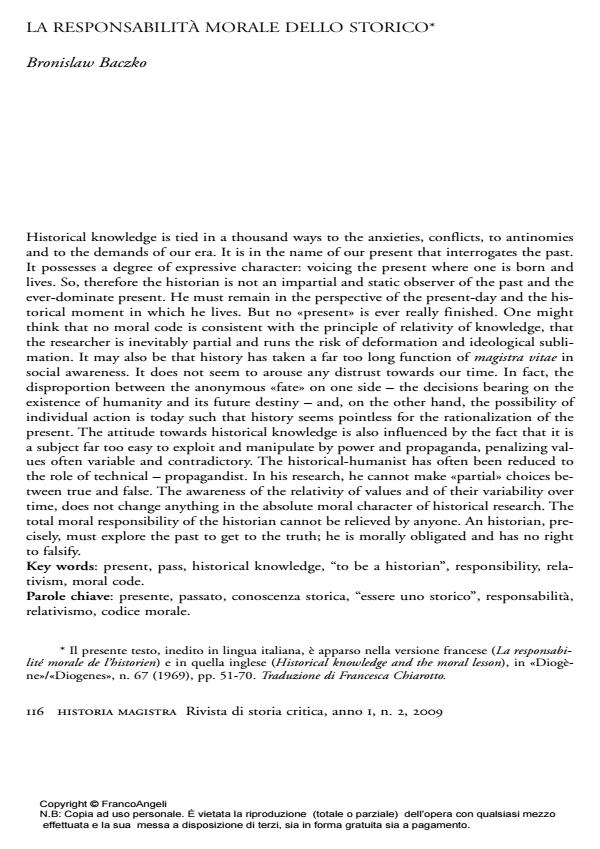La responsabilità morale dello storico
Titolo Rivista HISTORIA MAGISTRA
Autori/Curatori Bronislaw Baczko
Anno di pubblicazione 2009 Fascicolo 2009/2
Lingua Italiano Numero pagine 11 P. 116-126 Dimensione file 112 KB
DOI 10.3280/HM2009-002011
Il DOI è il codice a barre della proprietà intellettuale: per saperne di più
clicca qui
Qui sotto puoi vedere in anteprima la prima pagina di questo articolo.
Se questo articolo ti interessa, lo puoi acquistare (e scaricare in formato pdf) seguendo le facili indicazioni per acquistare il download credit. Acquista Download Credits per scaricare questo Articolo in formato PDF

FrancoAngeli è membro della Publishers International Linking Association, Inc (PILA)associazione indipendente e non profit per facilitare (attraverso i servizi tecnologici implementati da CrossRef.org) l’accesso degli studiosi ai contenuti digitali nelle pubblicazioni professionali e scientifiche
La responsabilità morale dello storico - Historical knowledge is tied in a thousand ways to the anxieties, conflicts, to antinomies and to the demands of our era. It is in the name of our present that interrogates the past. It possesses a degree of expressive character: voicing the present where one is born and lives. So, therefore the historian is not an impartial and static observer of the past and the ever-dominate present. He must remain in the perspective of the present-day and the historical moment in which he lives. But no «present» is ever really finished. One might think that no moral code is consistent with the principle of relativity of knowledge, that the researcher is inevitably partial and runs the risk of deformation and ideological sublimation. It may also be that history has taken a far too long function of magistra vitae in social awareness. It does not seem to arouse any distrust towards our time. In fact, the disproportion between the anonymous «fate» on one side - the decisions bearing on the existence of humanity and its future destiny - and, on the other hand, the possibility of individual action is today such that history seems pointless for the rationalization of the present. The attitude towards historical knowledge is also influenced by the fact that it is a subject far too easy to exploit and manipulate by power and propaganda, penalizing values often variable and contradictory. The historical-humanist has often been reduced to the role of technical - propagandist. In his research, he cannot make «partial» choices between true and false. The awareness of the relativity of values and of their variability over time, does not change anything in the absolute moral character of historical research. The total moral responsibility of the historian cannot be relieved by anyone. An historian, precisely, must explore the past to get to the truth; he is morally obligated and has no right to falsify.
Key words: present, pass, historical knowledge, "to be a historian", responsibility, relativism, moral code.
Parole chiave: presente, passato, conoscenza storica, "essere uno storico", responsabilità, relativismo, codice morale.
Bronislaw Baczko, La responsabilità morale dello storico in "HISTORIA MAGISTRA" 2/2009, pp 116-126, DOI: 10.3280/HM2009-002011